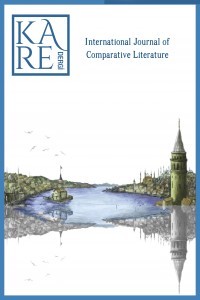In Deleuze and Guattari: What is the Minor Writing? from the Perspective of Difference and the Minor Literature
In Deleuze and Guattari: What is the Minor Writing? from the Perspective of Difference and the Minor Literature
Minor Writing, Minör Literature, , Gilles Deleuze Major Writing,
___
- Bryden Mary, Gilles Deleuze-Travels in Literature, New York: Palgrave Macmillian 2007.
- Charles J. Stivale, “Gilles Deleuze&Felix Guattari: Schizoanalysis&Literary Discourse”, Substance, 1980. Vol. 9, No. 4, Issue 29 (1980), pp. 46-57. http://www.jstor.com/stable/3684040
- Baugh Bruce, “How Deleuze can help us make Literature work,” Deleuze and Literature, Edinburg: Edinburg University Press, 2000, pp. 34-56.
- Crawford T. Hugh, “The Paterson Plateau: Deleuze, Guattari and William Carlos Williams,” Deleuze and Literature, Edinburg: Edinburg University Press, 2000, pp. 57-79.
- Corngold Stanly, “Kafka and the Dialect of Minor Literature,” College Literature, Vol. 21, No. 1 (Feb., 1994), pp. 89-101. http://www.jstor.com/stable/25112084
- Deleuze Gilles, Essays Critical and Clinical, translated by Daniel W. Smith and Michael a. Greco, New York: Verso, 1998.
- Gilles Deleuze, Pure Immanence, Essays on A Life, translated by Anne Boyman, New York: Zone Books, 2001.
- Deleuze. G-Guattari. F, Kafka Toward a Minor Literature, translated by dana Polan, London: University of Minnesota Press, 1986.
- Deleuze Gilles, The Logic of Sense, translated by Mark Lester with Charles Stivale, London: The Athlone Press, 1990.
- Deleuze Gilles, Desert Islands and Other Texts, translated by Michael Taomina, New York: Semiotext(e) 2002.
- Deleuze, Gilles and Guattari Felix, What is Philosophy? Translated by Hugh Tomlinson and Graham Burchell, New York: Columbia University Press, 1994.
- Lambert Gregg, Who’s Afraid of Deleuze and Guattari? London: Continuum, 2206.
- Marks John, “Gilles Deleuze-Vitalism and Multiplicty,” The Literary Machine, Pluto Press, pp.123-139. http://www.jstor.com/stable/j.ctt18mvnkx.11
- Pearson Keith Ansell, “Deleuze, Philozophy, and Immanence,” Deleuze and Religion, edited by Mary Bryden, London: Routledge, 2001, pp.141-155,
- ISSN: 2536-4596
- Yayın Aralığı: Yılda 2 Sayı
- Başlangıç: 2016
- Yayıncı: Hasan BAKTIR
Türkiye'de Bir Siegfried Efsanesi
Ali Osman ÖZTÜRK, Çevirmen: Ali Osman ÖZTÜRK
Fatma Akerson’un Eserlerinde Anlatıcıların Rolü
Kurgudan Sinemaya José Saramago’nun Körlük Adlı Eserinin İncelenmesi
Türkiye’de Germanistik Alanında Yürütülen Karşılaştırmalı Çalışmalar
Meryem NAKİBOĞLU, Birsen ERKURT
Çeviri Üzerinden Kültürlerarasılığı Okumak
İlyas ÖZTÜRK, Fatıma GİMATDİNOVA
D.H. Lawrence’ın Âşık Kadınlar ve Toni Morrison’ın Sula Adlı Eserlerinde Toplumsal Yaşamda Kadın
